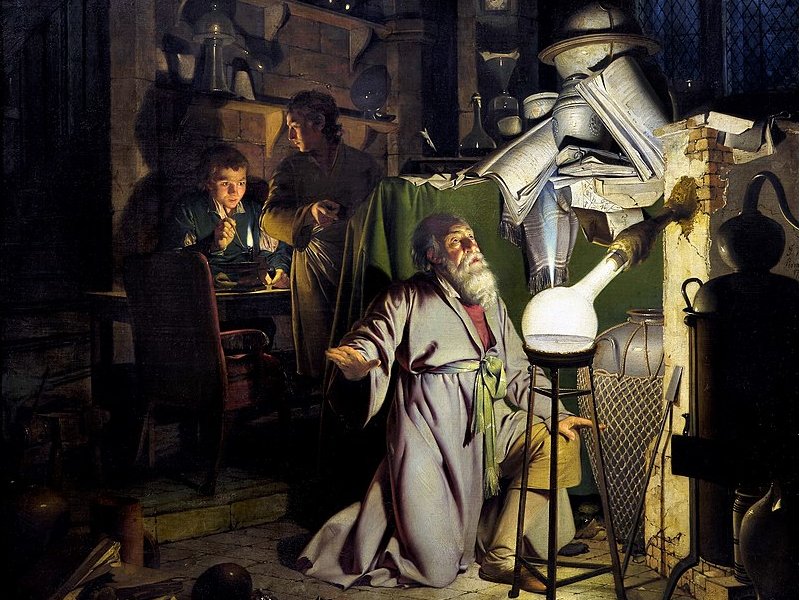This logos holds always but humans always prove unable to ever understand it, both before hearing it and when they have first heard it.
For though all things come to be in accordance with this logos, humans are like the inexperienced when they experience such words and deeds as I set out, distinguishing each in accordance with its nature and saying how it is.
But other people fail to notice what they do when awake, just as they forget what they do while asleep.
— Diels–Kranz, 22B1
Where is reason in a world saturated by madness?
Logic originates from the ancient Greek word logos meaning 'word,’ ‘discourse’ or ‘reason.' In modern English, logos quietly resides in many disciplines as the suffix ‘-logy,’ which denotes the “study of” or “language of” a particular discourse. For example, biology consists of ‘bio-,’ meaning life and ‘-logy,’ which describes the field as the “study of life” or a “language of life.”
But the ancient sense of the word logos is much richer than this interpretation.
Beginning with Heraclitus (c. 535 – c. 475 BC), the word logos was used to describe the relationship between rational linguistic discourse and the rational structure of the world — it refers to a simple philosophical observation: although the world resides in a continuous state of change, there exists a constant that bestows order, balance and reason to everything within the world.
This constant is the logos.
The idea of a supreme governing principle also influenced Plato (c. 428 – ca. 348 BCE) who infamously proposed the existence of two realms:1 a mutable and perishable material realm, and a non-material realm full of perfect eternal entities. The physical world was thus a derivative of the non-material world with imperfect incarnations.2
Naturally, this idea not only spread throughout philosophical tradition, but also exists within many religions, including Christianity and Islam.
For example, consider the following, where “the Word” is a direct translation of logos.
In the beginning was the Word, and the Word was with God, and the Word was God.
— John 1:1
Logos also influenced Carl Jung’s analytical psychology, where he describes polar unions, such as “science vs mysticism,” “reason vs imagination” and “conscious activity vs unconscious activity,” as “logos vs eros.” In the Jungian framework, eros represents the emotional and non-reason oriented aspects of the mind. Thus, logos and eros respectively correspond to masculine and feminine archetypes, which must work in unison to balance an individual’s psyche.
Practical logic attempts to reason within a constant system to achieve order and balance (i.e., the suffix ‘-ic’ means “having to do with,” thus logic ‘pertains to’ logos). Modern logic is mathematical logic, which is a derivative of Aristotle’s logic3, and can structurally eliminate fallacies and absurdity. There are many modern varieties including classical logic, intuitionistic logic, modal logic, etc.
Quite surprisingly, logic is a special kind of language.4
One does not study language without studying logic, and one does not study logic without studying language, because there is a unifying principle.5 The novelist and the physicist are contrasting specialists within the same universal language.
Chomsky, through the works of Rene Descartes and the Port-Royal Grammar (1660), posited the existence of a universal grammar claiming that human thought structures are based on a common logic, therefore all natural languages are structurally similar, because there is only one logic. On the other hand, Ludwig Wittgenstein with his beetle-in-a-box thought experiment, leads us to imagine that each individual has a unique meaning for common words, called private languages.6
Does Wittgenstein contradict Chomsky?
Wittgenstein’s private language argument is observable in practice.
e.g., In a classroom, ask each child to describe what a single word means.
No two answers will be the same unless the definition has been trained through practice.e.g., Ask a college student, a historian and a 70 year old the definition of fascism.
Each answer will be different — very different.
Semantic consensus is only possible after prolonged group reinforcement, because our conscious minds are not connected (thankfully). Given enough separation and time, interpretations gradually drift. All humans may have the same abstract language structures, but individuation produces the private language effect.
Understanding this, our minds have an innate capability of expressing a pure form of logic, but can also produce contaminated absurdities through misinterpretation.
Logic poured the foundation of western civilization.
Formal languages have paved the way for significant developments in mathematics and physics. Despite recent controversies, scientific applications have dramatically improved our quality of life.
Consider sanitation systems.
e.g., How does your toilet work? How does the water fill the tank and “know when” to stop? How does the flush spiral out in a cleaning motion? How does the water exit?
We rarely consider these questions (unless there’s nothing to read), but we expect these features to work when needed, especially for those foolish enough to eat Taco Bell.
Without sound engineering principles in fluid mechanics and material sciences, our modern sanitation systems would be an impossible dream. Outhouses, ditches and other “displacement systems” would quickly result in unsanitary and disease prone environments, especially for a population of our size.
Thank you, toilet engineers.
Consider food.
e.g., How is it possible to produce enough beef to supply restaurants and grocery stores across the country? Throughout the year? How is it possible to reliably produce lettuce, tomatoes, cucumbers and peppers with consistent quality and quantity?
Without ammonia production facilities, potash and phosphorite mines, chemically engineered to synthesize standardized fertilizers, could farmers grow enough crops to feed cities? And without engineered tractors, harvesting and distribution equipment, could crops be reliably be planted, processed and transported from field to plate?
Thank you, farmers and agricultural engineers.
While science has improved our quality of life, its applications are not without consequence. When does logic, that which pertains to rational order and balance, destroy? Despite its pragmatism, our models of reality are not reality itself. To seek absolute knowledge of the logos is an absurdity, because this is the temptation to know everything, and the temptation to become a god.
… but of the tree of the knowledge of good and evil you shall not eat, for in the day that you eat of it you shall surely die.”
— Genesis 2:16-17
Through its “Great Work,” modern science has obsessed itself with a dark philosophy.
Is it possible to use a mathematical system of logic to prove anything?
Any logical proposition can be proved in mathematics, under one condition — that condition is an absurdity. Through absurdity, one could use a computer assisted logic verification system to prove 2 + 2 = 5. Absurdities are false statements or contradictions. From an initial absurdity, reason and logic can be used to produce another yet absurdity. Crazy produces more crazy.
Reasoning from absurdity creates an even greater absurdity.
Absurdity produces the illusion of knowing everything, and from absurdity, constructing a false reality using valid logical steps is a rather trivial task, provided the foundational absurdities remain undisturbed.
In 1919, Charles Ponzi developed an investment program that offered its investors a 50% return on deposits within 3 months. Ponzi’s investment program leveraged fluctuations in postage prices, and allowed him to purchase cheap international reply coupons (IRCs) and sell them for a large margin in the future, which is called an arbitrage.
Given his success, Ponzi was able to successfully raise funds for his investment program. Ponzi however, never invested these deposits in IRCs, and used new deposits to pay off existing investors. This method relies on a continuous stream of new investors.
The scheme was successful until it was investigated and shutdown in 1920.7
These days, “adding value” consists of branding existing products with glamour, while offering no new improvement; the good sold is a fantasy. More money is made capturing attention than real production, and earnings from real goods and services are taxed or inflated away, then reallocated for political purposes.
To keep our fraudulent system going, there must be a continuous stream of “new investors.” After defrauding and robbing the public, the next logical absurdity is to enslave its population under a tyrannical social order.
This is the purpose of totalitarianism, which subjugates through absurdities.
Absurdity is destroying the foundations of western civilization.
To obtain absolute control, the absurdity must be absolute.
In search of practical action, I’m inspired by the story described in a recent post by
— How To Live Not By Lies.The simple step of a courageous individual is not to partake in the lie.
One word of truth outweighs the world.
— Alexander Solzhenitsyn
The above post describes an infamous text by Alexander Solzhenitsyn when he was exiled from the Soviet union in 1974. The text describes how fear saturated the minds of Soviet citizens, and despite hunger, poverty and destitution, it was their own comforting lies that kept them enslaved. The false realities imposed by the totalitarian state were only made possible through citizens rationalizing its absurdities.
Is it hopeless to challenge a totalitarian regime as massive as Goliath?
What could one individual possibly do?
Tell the truth and persistently seek honesty.
The logos, unlike our imperfect imitations, is consistent and complete. Under the logos, absurdity always fruits chaos and destruction. Those who use it to construct their false reality, one in which they know good and evil, shall surely die.
Garbage, under the divine logos, conveniently takes itself out.
If you choose life, then you must choose truth. Death awaits those who serve under the absurd. Do not attempt to reason with the absurd. Do not feed the absurdities of war, mutilation or desecration. Do not feed the absurdities of terror.
The mass terror strikes in Israel this weekend should serve as a "wake up" call for Americans, according to former House speaker Kevin McCarthy (R., Calif.), who told the Washington Free Beacon in a wide-ranging interview that the chaos at the U.S. southern border could set the stage for a similar type of terror attack.
What do articles like these want you to think, and subsequently do?
(Personally, I’d make sure my pantry was fully stacked.)
Our private languages can work as a defence against group think. As individuals, we can challenge hive minds infected with terror through critical inquiry. Nurture your moral courage to persistently seek out truth, because behind the universal grammar is a voice speaking directly to you through the divine logos. Listen, and navigate through the polluted thought-forms infecting our society.
War is a supreme absurdity, and its terror brings disorder to the mind. The greedy are waiting for blood in the streets, and if you value your life and others, your individual behaviour matters, because your job is to never allow absurdities to go unchallenged.
Consider reviewing these 7 necessary attitudes from my previous post.
Propaganda ensnares the fearful into false realities.
We may be crucified for speaking the truth, but Hell awaits those who fester in lies.
Publicity is justly commended as a remedy for social and industrial diseases.
Sunlight is said to be the best of disinfectants; electric light the most efficient policeman.
— Louis Brandeis
Colli, I. (Nov. 5, 2019). Logos: Mind of god —. Ilario Colli. https://ilariocolli.com/articles/logos-mind-of-god
Smith, R. (2022). Aristotle’s Logic. The Stanford Encyclopedia of Philosophy (Winter 2022). Metaphysics Research Lab, Stanford University. https://plato.stanford.edu/entries/aristotle-logic
See Formal Language.
See Typelogical Grammar.
Candlish, S., & Wrisley, G. (2019). Private Language. The Stanford Encyclopedia of Philosophy (Fall 2019). Metaphysics Research Lab, Stanford University. https://plato.stanford.edu/entries/private-language/
Corporate Finance Institute (May 3, 2020). Ponzi scheme. https://corporatefinanceinstitute.com/resources/wealth-management/ponzi-scheme/










Wow, Theodore! You've outdone yourself with this one. And, it's interesting that you would write about the Logos and how the vast majority of people don't even know what that is, much less understand it, because I've been thinking about this deeply during my daily silent times. Thank you for this!
Hot damn, this is a fantastic read! We are truly living in a world so thoroughly constructed from a GIGO machine of lies that the average person is wholly untethered from virtually (I use the word advisedly haha) anything real and true. And to paraphrase Krishnamurti: ""It is no measure of health to be well-adjusted to a profoundly sick society."
From Heraclitus to Wittgenstein, you hit all of my faves. I can only share this relevant clip from my beloved "Waking Life" in case you haven't seen it, as I think you'll quite enjoy it. The whole movie is bloody brilliant.
https://www.youtube.com/watch?v=iDGMS_tjRxU
Panta rhei, baby!